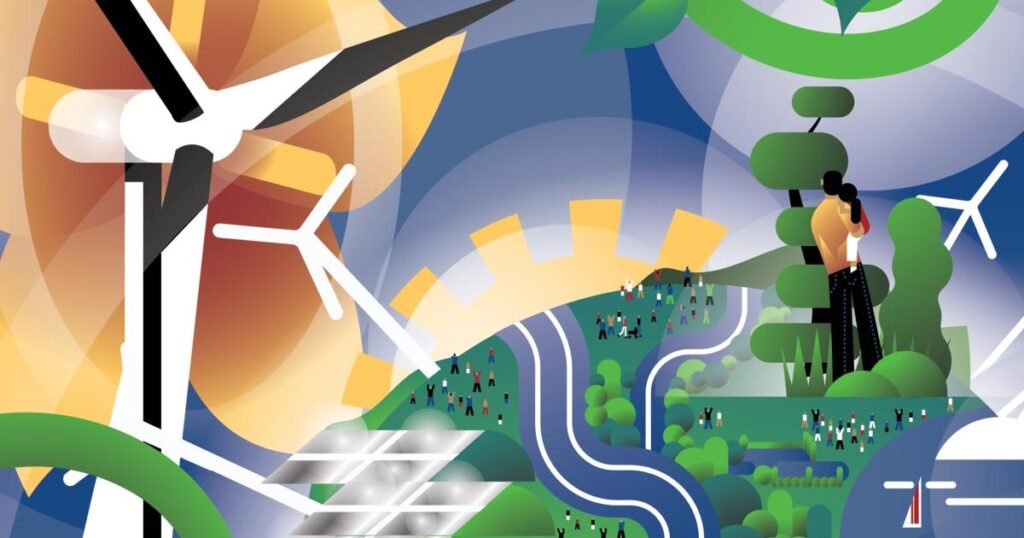We find ourselves in one of the greatest dramas in history.
The story began when, through a trick of evolution, a single ape species developed an extremely large and complex brain. Thanks to these brains, we have been able to bend nature to our will, releasing a wealth of energy and resources that facilitate almost unimaginable improvements in human development. In the past 75 years alone, life expectancy has nearly doubled, and child mortality and extreme poverty have fallen by a fifth.
However, the advances in science and technology that have brought about these advances are also accelerating our destruction of nature. We require 40% of the world’s surface and nearly half of the world’s accessible fresh water to feed ourselves. We have cut down half of the planet’s temperate and tropical forests. Pollution from our businesses contaminates our air, water, and soil. And we are changing the Earth’s climate at an alarming pace. Two-thirds of the birds, reptiles, amphibians, fish, and mammals that once shared our planet have disappeared. One million species are at risk of extinction, many within the next few decades.
All of nature became collateral damage in pursuit of our ambitions.
In the field of planetary health, these biophysical changes interact to affect human outcomes, including the amount and nutritional value of the food we can produce, the quality of air and water, and exposure to infectious diseases and extreme weather events. We see that we are eroding the foundations of our happiness. , and even the livability of the places where many of us live. Every aspect of human health is affected. The enormous health gains we have made over the past few decades are currently threatened by the deterioration of our natural life support systems.
The health burden is also not equally or equitably distributed. As warming temperatures bring malaria into the highlands of East Africa, the poorest households who cannot afford bed nets will be the most vulnerable. With fewer pollinating insects and lower crop yields, rich people can buy fresh fruits and vegetables, while poor people can’t afford to eat these foods, leading to higher rates of heart disease, stroke, and certain cancers. morbidity is higher. The consumption patterns and values of the richest endanger the poorest and future generations. Indigenous knowledge, which has long emphasized our interdependence with natural systems, has been marginalized or destroyed.
Millions of years of biological evolution and thousands of years of social evolution have led us to this question. “Can we change?”
This is where we find ourselves: our cleverness may be our undoing. The same complex brain that conquered much of nature recognizes that the state of natural systems and human well-being cannot remain disconnected. People around the world are suffering. A wild and miraculous tapestry of life is about to be woven. We are on a scorched path towards extinction.
Awakening to the ferocious urgency of this moment, the only way we can move forward involves deep and rapid structural changes in the way we live and a global commitment to the protection and restoration of Earth’s natural systems. You can see that work is needed. This understanding has great potential.
If we look at the world’s food systems, energy systems, manufacturing, urban design, and green chemistry, we find a rich landscape of solutions. We can imagine the world 100 years from now. There, human populations are stabilized by educating girls, creating economic opportunities for women, and increasing access to contraceptives. A world powered by renewable energy. A world where food and goods are produced with significantly reduced inputs into ecosystems. and a world where most of us live in cities that optimize our physical, mental and cultural health while allowing nature to regenerate. Every decade that passes in this world gives more room to the rest of the biosphere. It’s called a sea change, and everyone, everywhere has a role to play.
Millions of years of biological evolution and thousands of years of social evolution have led us to this question. “Can we change?” When we wake up to this moment, can we meet its demands? With humility, compassion, and acknowledging the need for a different path, can we Can we find the courage to collectively embrace this? How do we answer the only question that matters: “How do we live?”
A hundred years from now, this could be our story. Once upon a time, on a stunningly beautiful planet, a young species with extremely large brains wakes up to discover that their narrow self-concept and short-sightedness are putting them in danger. And, with eyes opened, it charted a new path where selfishness gave way to collectivism, domination and exploitation was replaced by regeneration, and extinction became renaissance.
The choice is ours. What kind of story should I write?

